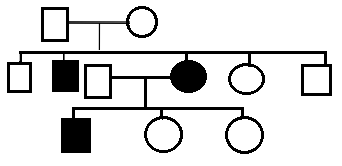The genotype of a plant showing the dominant phenotype can be determined by
(1) test cross
(2) dihybrid cross
(3) pedigree analysis
(4) back cross
ABO blood groups in humans are controlled by the gene I. It has three alleles — IA, IB and i. Since there are three different alleles, six different genotypes are possible. How many phenotypes can occur?
1. Three
2. One
3. Four
4. Two
Select the correct statement from the ones given below with respect to dihybrid cross.
1. Tightly linked genes on the same chromosome show higher recombinations
2. Genes far apart on the same chromosome show very few recombinations
3. Genes loosely linked on the same chromosome show similar recombinations as the tightly linked ones
4. Tightly linked genes on the same chromosome show very few recombinations.
Which one of the following symbols and its representation, used in human pedigree analysis is correct?
(1) 
(2) 
(3) 
(4) 
Sickel cell anaemia is
(1) an autosomal linked dominant trait
(2) caused by substitution of valine by glutamic acid in the β-globin chain of haemoglobin.
(3) caused by a change in base pair of DNA
(4) characterized by elongated sickle like RBCs with a nucleus.
Study the pedigree chart given below

What does it show?
| 1. | Inheritance of a sex-linked inborn error of metabolism like phenylketonuria |
| 2. | Inheritance of a condition like phenylketonuria as an autosomal recessive trait |
| 3. | The pedigree chart is wrong as this is not possible |
| 4. | Inheritance of a recessive sex-linked disease like haemophilia |
Select the incorrect statement from the following
(1) linkage is an exception to the principle of independent assortment in heredity
(2) galactosemia is an inborn error of metabolism
(3) small population size results in random genetic drift in a population
(4) baldness is a sex limited trait
Which one of the following condition in human is correctly matched with its chromosomal abnormality/linkage?
(1) Klinefelter's syndrome—44 autosomes + XXY
(2) Colourblindness —Y-linked
(3) Erythroblastosis foetalis— X-linked
(4) Down syndrome—44 autosomes + XO
A human male produces sperms with the genotypes AB, Ab, aB and ab pertaining to two diallelic characters in equal proportions. What is the corresponding genotype of this person ?
(1) AaBb
(2) AaBB
(3) AABb
(4) AABB
In the hexaploid wheat, the haploid (n) and basic (x) numbers of chromosomes are:
1. n = 7 and x = 21
2. n = 21 and x = 21
3. n = 21 and x = 14
4. n = 21 and x = 7






